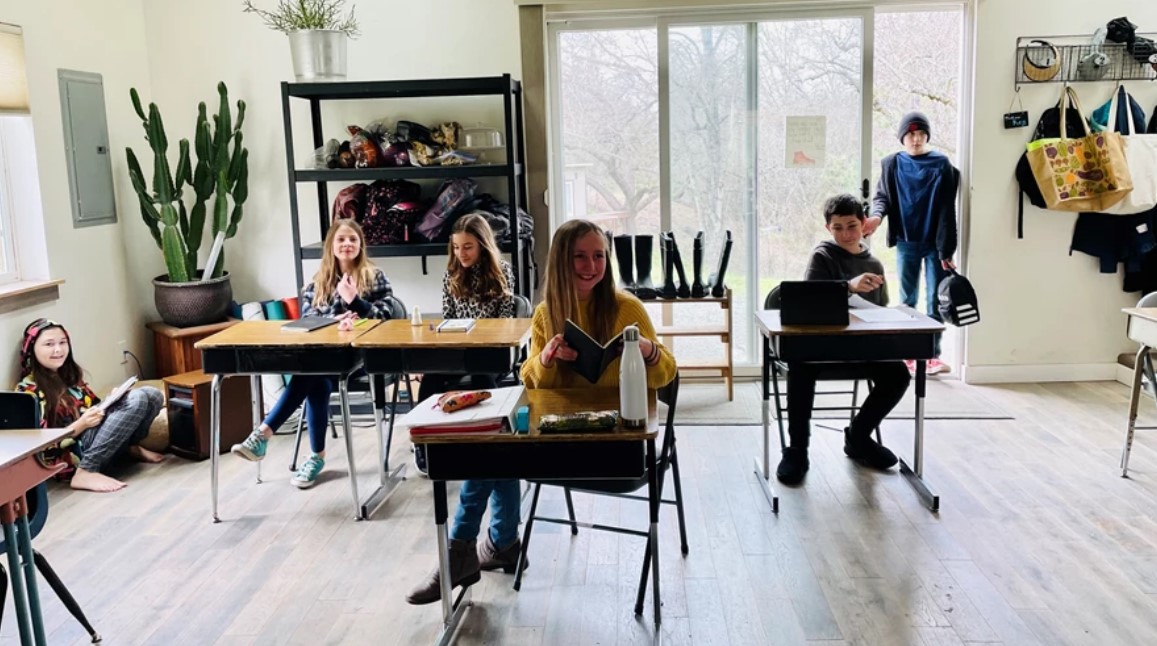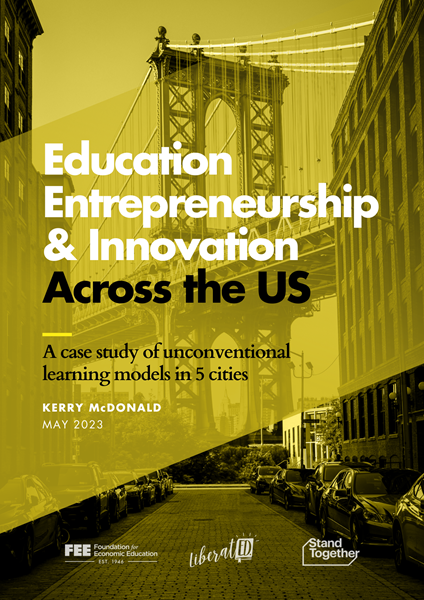The rise of bottom-up education models
Across the US, everyday education entrepreneurs are reimagining K-12 education in simple but profound ways. Some of these entrepreneurs are parents trying to solve an educational problem for their own families who decide to bring others along with them. Others are teachers who became fed up with one-size-fits-all standard schooling and set out to create better options. All are ordinary people who have taken on the extraordinary challenge of transforming K-12 education from the bottom up, with small, neighborhood solutions that are having a big, nationwide impact.
Increasingly, these solutions feature out-of-the-box learning models that challenge the traditional schooling status quo. They are learning pods and homeschool collaboratives that bring together local families for shared instruction. They are hybrid schools that offer part-time, drop-off classes for homeschoolers. They are microschools, which are intentionally small, mixed-age learning settings with hired educators that emphasize individualized, mastery-based learning. They are low-cost private schools that prioritize personalized learning. They are small, public charter schools that seek to innovate while offering a tuition-free option for families. They are virtual platforms, coaching services, tutoring centers, and similar programs that make it easier for parents and learners to step outside of a conventional classroom.
This burst of education entrepreneurship is occurring in big and small communities across the country. From the bustling boroughs of New York City to the suburban neighborhoods of Richmond, Virginia, to the busy Dallas/Fort Worth area of Texas and the lively neighborhoods of Detroit, to the rural corner of Grants Pass, Oregon, everyday entrepreneurs are creating innovative, community-based educational models that enable each individual learner to flourish.
Over the past few months, I have crisscrossed the country meeting these entrepreneurs and visiting the programs they’ve built, as well as interviewing them for my twice-weekly LiberatED podcast and regular articles at Forbes and FEE.org. These entrepreneurs are diverse in every possible way, from their geography and demographics, to their distinct educational philosophies and approaches, but they share a common commitment to meeting children’s educational needs beyond a traditional classroom.
Parents want different learning options
Interest in alternative education models, such as homeschooling and microschooling, had been rising during the first two decades of the millennium, as I detailed in my 2019 book, Unschooled: Raising Curious, Well-Educated Children Outside the Conventional Classroom. The education disruption caused by the Covid-19 pandemic response supercharged this interest. Beginning in 2020, more parents became aware of learning options beyond their local, traditional schools and became more receptive to different types of teaching and learning methods.
According to a 2023 analysis by Stanford economist Thomas Dee, more than 1.2 million students left local district schools between the 2019/2020 and 2021/2022 school years, with many of them going into homeschooling or private schooling settings—and staying there. As Chicago PBS reported in January 2023, the Chicago Public Schools have lost 10 percent of their student body, or about 37,000 students, between the 2019 and 2022 school years. Ninety-one percent of those students who left are from low-income, predominantly minority households. They are choosing private education and charter schooling instead.
Download: Education Entrepreneurship & Innovation
In 2021, the U.S. Census Bureau confirmed this exodus from district schools, reporting a doubling of the homeschooling population and a five-fold increase in the number of black homeschooled students, who became overrepresented in the homeschooling population compared to the overall K-12 public school population. Homeschooling numbers today remain well above pre-pandemic levels in most areas of the US. Private schools and charter schools have also seen enrollment gains in many places over the past three years, and rough estimates suggest that up to two million students are currently learning full-time in a microschool.
Parents want new and different education options. They want alternatives to the traditional school system, as recent polling from Populace, a Massachusetts think tank, revealed. “Americans don’t want ‘better’; they want different,” said Todd Rose, a former Harvard Graduate School of Education professor and the cofounder of Populace. “They want a way out of the one-size-fits-all approach driven by standardized testing models and elite institutions making us compete in a zero-sum game and instead an educational framework geared towards individualized learning, practical skills, and preparation for a meaningful life.”
Everyday entrepreneurs are reimagining learning
Everyday entrepreneurs are responding to this growing demand for different learning models beyond standard schooling. The VELA Education Fund, a philanthropic non-profit that supports non-traditional, out-of-system learning models, has issued 2,000 grants to these everyday entrepreneurs since 2019, totaling more than $24 million. In surveying their grantees, VELA found that 93 percent of the students and families attending these non-traditional learning environments are low-income or from historically underserved populations, and nearly 40 percent of the entrepreneurs leading these programs are intentionally serving these populations as part of their organizational mission.
“Our research affirmed something we at VELA already knew: that unconventional education is for everyone — not just for white, affluent families,” said Michael Crawford, VELA’s Director of Community Research. “What we continue to see is that a diverse range of entrepreneurs are creatively responding to the needs of learners and families in their communities by devising bespoke, flexible, and resilient business models to launch and sustain their programs.”
Research conducted by the National Microschooling Center reveals similar results, with the opportunity to serve “systemically underserved or marginalized communities” named the top motivator of 100 prospective founders, followed by the opportunity to “enable children to thrive as they had not in prior settings.”
This case study offers snapshots of 35 of the entrepreneurial parents and educators who are transforming K-12 education in five communities across the country, showing parents what is possible for their children and encouraging aspiring entrepreneurs everywhere to take their own enterprising leaps.
Download the full case study here.
Source: FEE
Kerry McDonald is a Senior Education Fellow at FEE and host of the weekly LiberatED podcast. She is also the author of Unschooled: Raising Curious, Well-Educated Children Outside the Conventional Classroom (Chicago Review Press, 2019), an adjunct scholar at the Cato Institute, education policy fellow at State Policy Network, and a regular Forbes contributor. Kerry has a B.A. in economics from Bowdoin College and an M.Ed. in education policy from Harvard University. She lives in Cambridge, Massachusetts with her husband and four children. You can sign up for her weekly email newsletter here.

